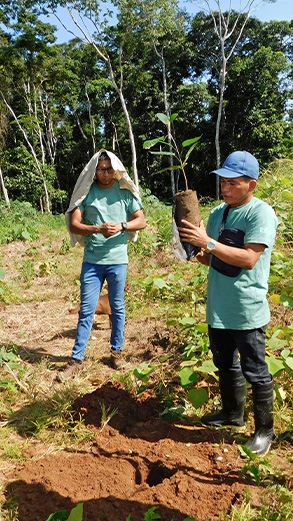Countries:
Peru
Status:
Completed
Sector:
Nature
Supporting the development of sustainable agroforestry businesses run by indigenous populations in the Peruvian Amazon.
Around 20% of Peru's forests are located on lands home to native communities. These forests face significant deforestation threats, primarily due to migratory cultivation and unsustainable agricultural activities, such as illegal logging.
Agroforestry and forest conservation practices in native communities are effective mitigation measures which contribute to the objectives of Peru’s Nationally Determined Contribution (NDC). Greater uptake of agroforestry within native communities could therefore play a key role in halting deforestation and contribute to emissions reduction in the long term.
However, these communities often lack technical and business knowledge to develop their agroforestry business. Therefore, this project aimed to build capacity amongst nine indigenous communities in the Amazon regions of Ucayali and Madre de Dios by:
Overall, the project’s activities empowered indigenous people to develop agroforestry business opportunities from the sale of agricultural and forestry products and carbon sequestration. The project also developed an indigenous MRV system to enable long-term sustainability. These activities contributed to building value chains that both contribute to climate change mitigation and improved livelihoods.
This project was delivered by Asociacion para la Investigacion y Desarrolo Integral (AIDER) in partnership with Bosques Amazónicos SAC and the Commerce Chamber of Indigenous Peoples of Peru.
“The work with AIDER was very good, relations with the project were great and there was constant communication. I learned a lot and asked for more training”
Juana Guimaraes
Flor de Ucayali Native Community
"The training and support received from AIDER and other indigenous brothers from other communities has been important. They came to our community to teach the necessary activities to implement agroforestry, such as nursery work for the production of cocoa seedlings."
Mr. Segundo López Tanchiva
Agroforestry producer from the Yamino Native Community, Ucayali
"The agroforestry work has been important and has seen increasing participation of women. AIDER should continue with technical assistance to support agroforestry which is a more sustainable activity, unlike gold mining which is not sustainable as it is done in Madre de Dios."
Mrs. Clara Yomira Cagna Payaba
President of the Cocoa Committee of the Tres Islas Native Community,
Madre de Dios

businesses brought together as a network of indigenous business associativity, promoting learning and exchange of experiences in agroforestry ventures linked to value chains
agroforestry plots established across four native communities
people trained to develop and implement sustainable agroforestry businesses
of investment opportunities in agroforestry identified in Ucayali for 11 years and USD 5280 for the first year in Madre de Dios
The project successfully built the knowledge and capacity of local communities to implement sustainable agroforestry businesses. The project delivered this across a range of outputs:
native communities supported in enhancing their technical and financial knowledge to implement sustainable agroforestry businesses
of members of the indigenous business associativity network are women
of total training participants were women
of total community members involved in establishing the 40 agroforestry plots were women
Following initial assessment, the project identified that native communities lacked the technical business and financial knowledge required for sustainable land management and utilising available opportunities. In this context, it targeted sustainable agroforestry businesses that could contribute to improving indigenous peoples’ livelihoods. The project proposal was also presented to local communities so members could contribute their own traditional knowledge and experiences and take greater ownership.
By embedding inherent GESI benefits and generating buy-in in this way, the project successfully facilitated the opening up of new economic opportunities for native communities, alongside the climate benefits of increasing agroforestry on the lands of these communities.
The key GESI benefits noted by the project include:

The project built a model supporting poverty alleviation in native communities of the Peruvian Amazon through scaling up agroforestry businesses which can significantly contribute to climate change mitigation. It also provided recommendations for taking forward the outputs and enhancing capacity building benefits:
Sustainable agroforestry business models designed and implemented in Ucayali and Madre de Dios
View PDFFinal project report outlining the methodological framework and key results from the project implementation in Ucayali
View PDFUK PACT (Partnering for Accelerated Climate Transitions) is a unique capacity-building programme. Jointly governed and funded by the UK Government’s Foreign, Commonwealth and Development Office (FCDO) and the Department for Energy Security and Net Zero (DESNZ) through the UK's International Climate Finance, it works in partnership with countries with high emissions reduction potential to support them to implement and increase their ambitions for tackling climate change.
© Copyright 2025 UK PACT Privacy Notice Cookie Policy